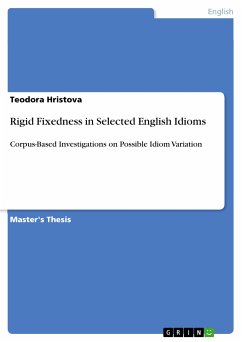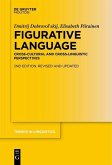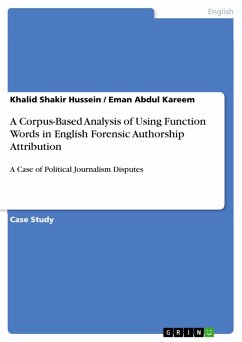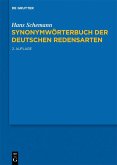Master's Thesis from the year 2008 in the subject English Language and Literature Studies - Linguistics, grade: 3,0, University of Hannover, language: English, abstract: The central topic of the present paper are the idioms in the English language. Interesting and peculiar, they are a very important part of the lexicon and exist in every language - even the artificial languages may produce idioms. In some earlier studies on idioms it has been claimed that they are nothing more than a fixed string of words with a meaning, different from the meanings of its composite elements. Psycholinguists have lent a hand in supporting this view as well. Scholars generally have assumed that idioms exist as frozen, semantic units within a speaker's mental lexicon in the same way that words or stings of them are represented mentally (Gibbs, 1993: 57). Thus they need separate entries in the dictionaries and have to be learned by heart and kept in mind as single words - so they appear to be nothing more than long lexemes. Idioms have been also commonly thought of as metaphors that have become fixed or fossilized over time and have become "dead" expressions in a language. Taking this into consideration, in this paper I aim at proving that idioms are not as frozen and fixed as they are supposed to be and that on the contrary, these expressions are quite "alive" - varying, changing and coloring the language. Actually long time has passed and a lot of research has been done since the time when idioms were defined as completely frozen items and kick the bucket was a representative example of a typical idiom. Idioms are no longer considered just expressions the meaning of which cannot be understood from the meanings of their constituents. During the last few decades of research many investigations in various branches of linguistics - sociolinguistics, psycholinguistics or corpus linguistics, to name a few, have proved that idioms are much more than a simple fixed string of words with own meaning. Now we know that there are quite a large number of idiomatic expressions in language, varying in their degree of compositionality, fixedness and opacity. In spite of the fact that idioms have been always considered to belong to the group of the fixed expressions, nowadays their absolute fixedness is a myth. In fact, different authors in the idiom literature give varying degrees of importance to this property. Sinclair (1996: 83) has reached to the conclusion that the "so-called 'fixed expressions' are not in fact fixed" and then Moon (1998: 2) put also an emphasis on the fact that "many fixed expressions ...
Dieser Download kann aus rechtlichen Gründen nur mit Rechnungsadresse in A, B, BG, CY, CZ, D, DK, EW, E, FIN, F, GR, HR, H, IRL, I, LT, L, LR, M, NL, PL, P, R, S, SLO, SK ausgeliefert werden.









